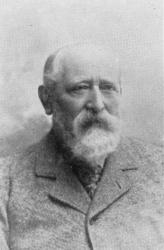
1830 - 1869 Person Name: Elizabeth C. Clephane Author of "Feliĉe kuŝis la naŭdek naŭ" in TTT-Himnaro Cigneta Clephane, Elizabeth Cecilia, third daughter of Andrew Clephane, Sheriff of Fife, was born at Edinburgh, June 18, 1830, and died at Bridgend House, near Melrose, Feb. 19, 1869. Her hymns appeared, almost all for the first time, in the Family Treasury, under the general title of Breathings on the Border. In publishing the first of these in the Treasury, the late Rev. W. Arnot, of Edinburgh, then editor, thus introduced them:—
"These lines express the experiences, the hopes, and the longings of a young Christian lately released. Written on the very edge of this life, with the better land fully, in the view of faith, they seem to us footsteps printed on the sands of Time, where these sands touch the ocean of Eternity. These footprints of one whom the Good Shepherd led through the wilderness into rest, may, with God's blessing, contribute to comfort and direct succeeding pilgrims."
The hymns, together with their dates,are:—
1. Beneath the cross of Jesus. Family Treasury, 1872, p. 398,
2. Mine eyes for ever closed. Family Treasury, 1872, p. 398.
3. Who climbeth up too nigh. Family Treasury, 1872, p. 552.
4. Into His summer garden. Family Treasury, 1873, p. 245.
5. From my dwelling midst the dead. Family Treasury, 1873, p. 365.
6. The day is drawing nearly done. Family Treasury, 1873, p. 389.
7. Life-light waneth to an end. Family Treasury, 1874, p. 595.
8. There were ninety and nine that safely lay. Family Treasury, 1874, p. 595.
Of these Nos. 1 and 8 are in common use. [Rev. James Mearns, M.A.]
--John Julian, Dictionary of Hymnology (1907)
Elizabeth Cecilia Clephane


 My Starred Hymns
My Starred Hymns




